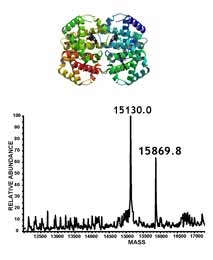"Proteomics", Mass Spectrometry and Puerto Rico
Submitted by Anonymous (not verified) on

We know that you are asking yourself what these three words from the title have in common: Proteomics, Mass Spectrometry and Puerto Rico. However, if we analyze them closely you will figure out. Beginning with proteomics, the word in Spanish is a bit difficult to pronounce: proteomica. Proteomics is the science field that studies proteins and their structure and function. And what does "Mass Spectrometry" have to do in this? WellÖ a lot because mass spectrometry (MS) is one of the analysis techniques used to determine the mass, identity and modification of proteins. And for those that are wondering what is Puerto Rico's role in all this; please blame Dr. Irving E. Vega, professor of biology from the University of Puerto Rico at Rio Piedras and member of CienciaPR, who is one of the pioneers in obtaining that these three concepts are a reality in our island.
Dr. Vega, who graduated from the UPR-Mayagüez, studied his doctorate in molecular biology and neuroscience from Rutgers University in New Jersey and afterwards did a post-doc in the Neuroscience Department of the prestigious Mayo Clinic, in where he specialized in mass spectrometry to study the proteins affected during the pathological processes associated to neurodegeneration. Upon his arrival to the UPR, Dr. Vega, created what is nowadays the Protein Mass Spectrometry Core Facility (PMSC) of the UPR. The PMSC was created thanks to the combined efforts of College of Natural Sciences, the Resource Center for Sciene and Engineering and the Protein Research Center (COBRE II). The center is equipped with a ProteomeX-LTQ Workstation (Thermo Fisher) for the MS analyses, a two dimension electrophoresis system and equipmen for protein purification.
For his research in the neuroscience field, Dr. Vega uses advanced protein analysis techniques, available in the PMSC, to understand the mechanisms leading to neurodegeneration induced by Tau proteins. Tau proteins mainly induce neurodegeneration by aggregating in the frontotemporal brain areas leading to diseases like Alzheimer's.
In addition, Dr. Vega and the PMSC, collaborate with other investigators from Puerto Rico, as with Drs. José E. García-Arrarás and Carlos I. González from the UPR-Rio Piedras, Joseph Bonaventura, from Duke University and UPR- Mayagüez, José Rodríguez-Medina form the Medical Sciences Campus of the UPR and Tharun Sundaresan, from Uniformed Services University of the Health Sciences, among others. In these collaborations, the role of the PMSC has been crucial in the experimental development for the the purificaiton and identification of proteins in different cellular processes from tissue regeneration to the formation of concrete in barnacles.
Dr. Irving E. Vega and the PMSC, besides been open to collaborations, also offer the protein MS services to higher education institutions and the industry. If you will like to know more about Dr. Vega and his research visit his profile at CienciaPR. For more information about the PMSC and the offered services, contact them at msfacility.upr@gmail.com.








